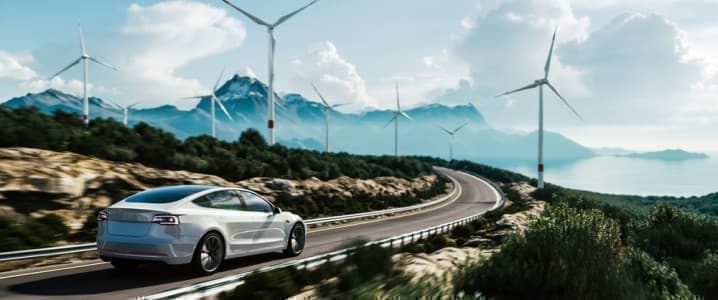Following a huge increase in investments in electric vehicles (EV) over the last year, with many major automakers announcing their plans for electrification, rental companies worldwide are beginning to make the switch. As governments launch green energy strategies to curb the sale of traditionally fuelled vehicles in favor of less-polluting alternatives, and energy companies invest in widespread charging infrastructure, consumers are becoming more open to the EVs that rental firms are getting ready to provide.
Over the last year, car manufacturers from Volkswagen to Nissan to Toyota all announced new EV models, as they pick up the pace of the electrification of their production. With major powers around the globe aiming for an energy transition that will help them to achieve net-zero carbon emissions by 2050, automakers have realized that the only way to succeed long-term is to develop more eco-friendly vehicles. While the consumer market for EVs remains small at present, greater investment in the early development of EV batteries and other components will help automakers eventually produce lower-cost cars that will appeal to the growing consumer base.
In response to the increase in production and consumer interest in EVs, rental companies are beginning to acquire EV fleets in favorable markets. The effects of Covid on the rental car industry have supported this shift, as many firms were forced to sell vehicles as demand plummeted, encouraging many to adopt EVs for their new fleets. Although buying new cars as business picks up is not so simple, with supply chains still badly affected by pandemic restrictions and delays.
With the outlook appearing vastly different from that of the pre-pandemic era, rental companies are now looking to innovate and adapt to the consumer demands of the future. Hertz bounced back from its 2021 bankruptcy with a bold statement that it would be investing $4.2 billion in the purchase of 100,000 Tesla EVs by the end of 2022, as well as 65,000 electric cars from Polestar. Hertz hopes that EVs will make up over 30 percent of its U.S. fleet by the end of 2024. This impressive decision led other rental companies, such as Enterprise Holdings and Avis Budget Group, to announce similar aims, in a shift away from internal combustion engine (ICE) vehicles.
However, these grand ambitions are not without their challenges. There is no quick way to change a vast, international fleet of cars from ICE to electric. Rental companies must consider several barriers to the EV roll-out including varying levels of consumer demand in different markets, the charging infrastructure available, and the availability of the EVs themselves.
But despite the challenges, Hertz and other rental firms believe the long-term investment needed to make the switch to electric will be well worth the cost and trouble. Hertz will mainly aim its EV fleet at corporate drivers, as lowering carbon emissions will help companies to achieve their environmental, social, and governance (ESG) targets. Chris Woronka, an analyst at Deutsche Bank, explains “The initial research has shown that corporate accounts are going to be willing to pay a premium for EVs… because it helps them achieve some of their ESG objectives.”. Not to mention the current cost of petrol, which is already making EVs look more appealing to many different consumer categories.
But with the EV market still in its infancy, it may not be easy to go and rent an electric option wherever. In 2021, EVs made up less than 1 percent of U.S. cars, accounting for around 3 percent of cars and trucks sold last year. And car rental companies that have yet to establish purchasing partnerships with EV manufacturers are likely to experience severe delays in access to EVs as the personal consumer EV market expands and supply chain disruptions cause further delays.
Related: China May No Longer Be A Pillar Of Growth For Global Oil Markets
But Teslas and other EVs are already becoming available under rental and subscription services in major markets, such as the U.S. and Canada. Craig Hirota, vice-president of government relations and member services at the Associated Canadian Car Rental Operators (ACCRO) explained, “Public perception and public awareness of EVs, zero-emission and hybrid vehicles is growing by the month and there’s certainly a lot more consumer curiosity about those types of vehicles.” This means it is important to equip rental and subscription firms with an EV fleet, preparing them to meet the rapidly rising consumer demand.
And small rental companies are gaining more traction by marketing themselves as EV specialists. For example, in Vancouver, rental car firm EV Rentals rebranded to become Zerocar in 2021, with a fleet of 50 Teslas, offering customers rental options from $8 an hour. Thanks to growing interest, it expects to triple its fleet by 2023. Other used-EV companies in Canada are trialing rental schemes to great success. Meanwhile, EV car-sharing companies, such as Communauto, Modo, and Turo, are also popping up across the country.
As interest in EVs increases worldwide, with the rise of the environmentally-conscious consumer, car rental and subscription services will have to prepare themselves to respond to demand if they are to remain relevant. Although, as we’re seeing industry-wide, supply chain disruptions from Covid and the inadequate pace of mining for battery components may restrict this growth in the short term.
By Felicity Bradstock for Oilprice.com
More Top Reads From Oilprice.com:
- 4 Nations That Could Help Solve The Global Fuel Crisis
- Europe Faces “Red Alert” For Gas Supply As Russia Reduces Flows
- Biden's Gas Tax Suspension Proposal Falls Flat In Congress


















